Western Canada and the country as a whole saw major moves made this year that impacted the construction industry in many ways. Pipeline progress and setbacks, uncertainty around megaprojects, impending marijuana legalization, wildfires and a historic election were just some of the issues that graced the front page of the Journal of Commerce (JOC) in 2017. Here is a breakdown of our Top 10 newsmakers.
The year of Site C uncertainty
The Site C hydroelectric dam project had its share of controversy in 2017.
The year started off with regular construction updates and stories revolving around the number of non-B.C. workers on the job as well as court proceedings and decisions with environmental and First Nations concerns.
But the usual stories around a megaproject of this size came to an abrupt halt when the future of the project was called into question shortly after the B.C. NDP government came into power.
In August, the British Columbia Utilities Commission (BCUC) was tasked with conducting an accelerated review of the project, its costs and the financial risks of delaying, cancelling or continuing it.
During the review period, various industry stakeholders anxiously awaited the results, with several associations pushing for the project to continue. The Independent Contractors and Businesses Association of British Columbia made presentations across the province and held “pink slip” events to represent the 2,500 workers who it said would face mass layoffs if the project was scrapped.
The initial findings from the commission didn’t look promising for continuing the multi-billion-dollar dam that was already two years into construction.
The BCUC report found Site C would likely not be able to meet its projected November 2024 completion date and will exceed its proposed budget of approximately $8.3 billion. The report also estimated completion costs could exceed $10 billion.
Termination and remediation costs would be $1.8 billion, in addition to finding alternative energy sources to meet demand. With that said, the BCUC panel found the “least attractive option” would be to suspend the project and restart it in 2024. That scenario, the report said, would cost an estimated $3.6 billion.
The government had a decision to make and stated it would do so before the end of the year.
Once again, the industry was left wondering and waiting.
Then, on Dec. 11, Premier John Horgan announced the project in northeastern B.C. would go forward, adding while he hadn’t supported Site C, leaving British Columbians with a $4 billion bill “with nothing in return” was unacceptable.
Approximately $2.1 billion has already been spent on the project and work continues.
Fate of LNG in B.C. looks grim
It was a campaign promise made by former B.C. Premier Christy Clark. The Liberals pledged in 2013 that 100,000 jobs and $100 billion in revenue would be generated over decades as massive liquefied natural gas (LNG) facilities set up shop in the province.
But 2017 would show the LNG climate in B.C. was not going to flourish.
In July, Pacific Northwest (PNW) LNG announced its $36-billion LNG project slated for Port Edward, B.C. was cancelled. PETRONAS and its partners decided the project was not feasible after assessing current market conditions. Several government agencies had already given the project the greenlight and agreements had been reached with numerous First Nation communities.
Construction industry stakeholders felt it was a huge blow to the B.C. economy and to job opportunities.
Two other major projects also remain up in the air. Shell-backed LNG Canada and Chevron’s Kitimat LNG, said they were proceeding toward final investment decisions, but analysts predict the facilities are unlikely to be built in the next three to five years, if at all.
The only LNG project currently in the works is the $1.6-billion Woodfibre LNG plant near Squamish.
– With files from the Canadian Press
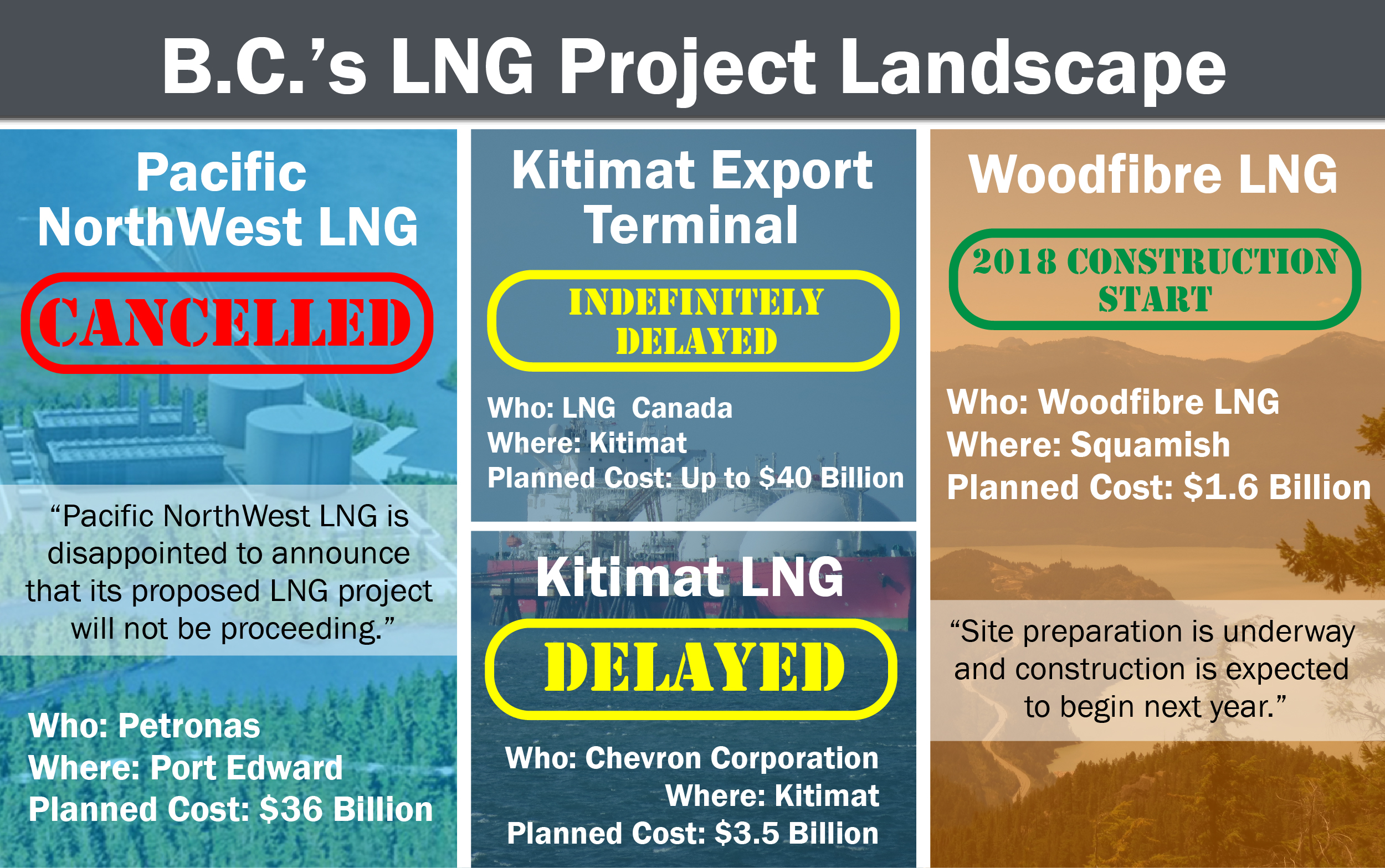
Trans Mountain pipeline overcomes obstacles in 2017
It’s been a year of wins and a year of battles for Kinder Morgan’s $7.4-billion Trans Mountain pipeline expansion project.
After getting the go ahead in late 2016 from the federal government, the project got a boost in early 2017 from the province of B.C. with an Environmental Assessment certificate for the B.C. portion of the expansion. It was a move that was applauded by industry.
As the year progressed and the government changed, Trans Mountain began to face more obstacles.
The B.C. NDP government has made it clear it adamantly opposes the project and in August announced it had retained legal counsel to challenge it. The province also applied for intervener status in court challenges against Trans Mountain, joining several First Nations and municipalities who state the project is not in the best interest of the province as it would increase the number of tankers in Vancouver-area waters.
Despite the province’s move to stop the project, Kinder Morgan did announce the six contractors it intends to work with on the Trans Mountain pipeline expansion in B.C. and Alberta in September.
Kinder Morgan made headlines once again not long after the contractor announcement, filing a motion with the National Energy Board (NEB) to allow construction to proceed on the project after failing to get necessary permits from the City of Burnaby, which the company claimed was delaying the approvals process. The city stated the process was taking so long because the permit and plan applications were extensive and complex.
In December, the NEB exempted Kinder Morgan from certain bylaws, meaning construction work can begin on the Trans Mountain expansion in Burnaby. The city accused the NEB of abusing its power as a result of the decision.
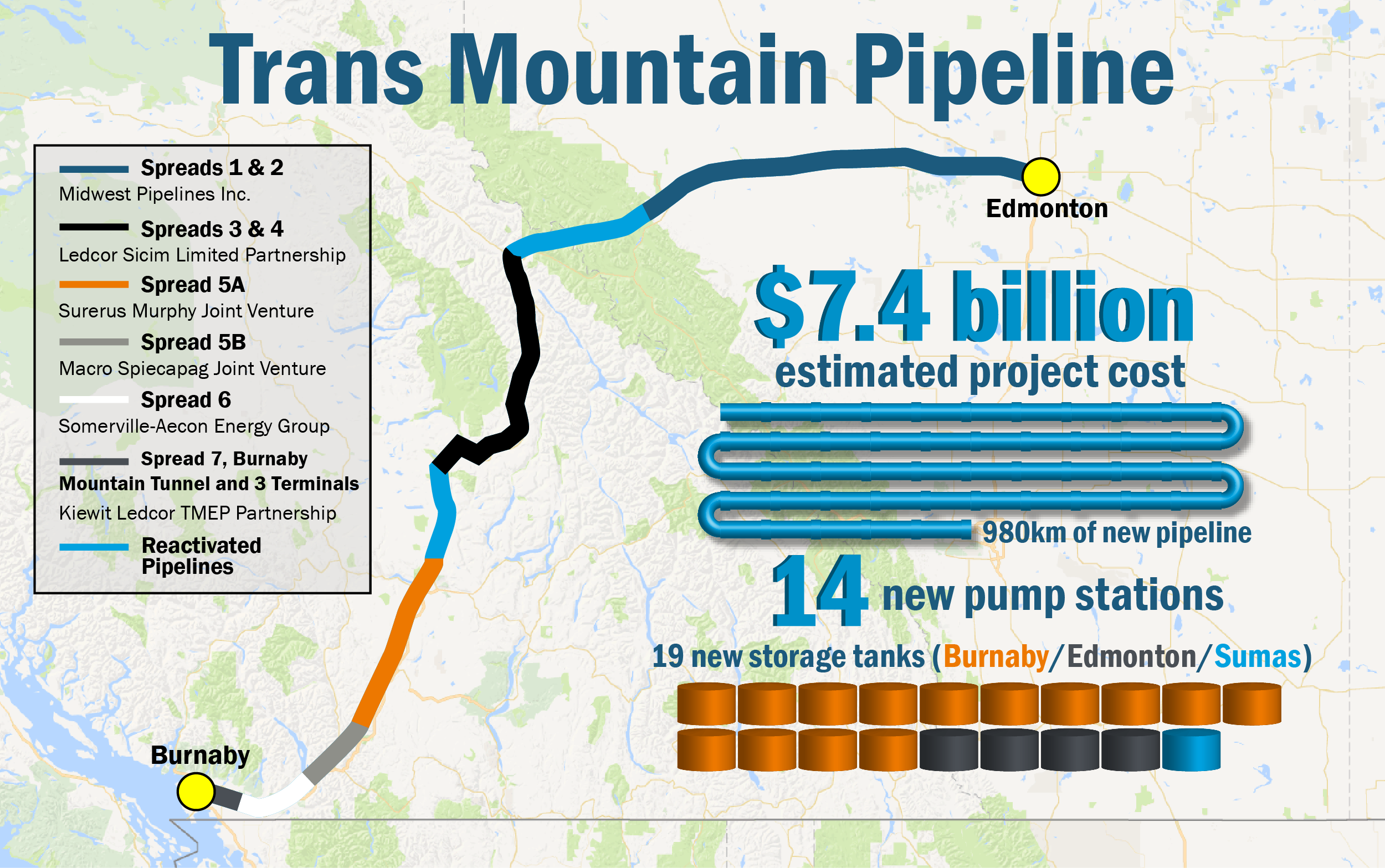
George Massey Tunnel replacement bridge procurement halted
In early spring 2017, it was announced that work had officially started on the George Massey Tunnel Replacement Project, a $3.5-billion initiative that would see the existing 60-year-old tunnel decommissioned and a new bridge constructed instead.
Two contracts had been awarded for site preparation work and it appeared as though the project was moving ahead, with that announcement adding the process to award major construction work was still underway and a preferred proponent was to be chosen this summer.
But then, in September, the province announced it was cancelling procurement on the bridge replacement project to investigate other transportation options for the corridor, prompting strong statements from those in favour and against the bridge, which would span from Richmond to Delta.
The province stated procurement activity was on hold until the results of a review were released and the project was not going to be budgeted for in the government’s capital plan.
B.C. election keeps voters guessing
It was an election where the final result was simply too close to call initially, but the outcome completely changed the political landscape in British Columbia.
After voters took to the polls on May 9, the results showed BC Liberal Party Leader Christy Clark remained premier in B.C. She lost her 49-seat majority won in 2013 and ended up with 43 elected seats, with 41 per cent of the popular vote. It was B.C.’s first minority government result since 1952.
But weeks of uncertainty would follow the election, as no single party won a majority of the seats.
Green Party Leader Andrew Weaver and NDP Leader John Horgan would eventually negotiate and form an alliance, ousting Clark as premier.
On June 29, British Columbia Lt.-Gov. Judith Guichon declared Horgan and Weaver would form the next government. Horgan would become premier.
Construction industry prepares for the legalization of marijuana
The Trudeau government announced plans in 2017 to legalize marijuana by July 1, 2018, which left many in the construction industry uncertain about how best to prepare worksites for this new world.
Throughout the year, many national and provincial conferences held forums, panel discussions and symposiums about how best to deal with weed in the workplace.
The Canadian Construction Association hosted a session on the topic during its 99th annual conference in Mexico; the Vancouver Regional Construction Association’s leadership forum addressed Weed at Work: Risk for Employers; the Ontario General Contractors Association hosted a session during its symposium and co-hosted a Cannabis in Construction event with the Residential Construction Council of Ontario; and Construct Canada held a session billed Cannabis on Job Sites: Legal Insights of Upcoming Legislation.
This names but a few of the events and discussions that took place and were featured in the JOC and Daily Commercial News throughout the year.
While the outcome of the legalization remains to be seen, those in the construction industry all agreed safety needs to take priority above all else.
B.C. wildfires prompt #Here4BC campaign
B.C.’s northern construction industry was hit hard from the wildfires that raged through the province this summer, halting projects as residents fled from the flames.
As of September, more than 11,000 square kilometres had been burned in what was coined a historic wildfire season.
Fire crews were brought in from Australia, New Zealand, Mexico and the U.S. to help relieve crews.
A city-wide evacuation alert was issued for Williams Lake and several other surrounding areas were also impacted by the fires.
Two of the largest lumber producing areas and both of the largest plywood/sheathing production regions in B.C. were impacted by the blaze for much of the summer, which resulted in builders facing unpredictable price hikes and diminished supply.
As the fire continued to burn throughout, the B.C. construction industry stepped in to do its part to help. The Vancouver Regional Construction Association launched the #Here4BC campaign and raised more than $125,000 for the Red Cross British Columbia Fires Appeal.
Buy America, NAFTA dominate Trump talks
U.S. President Donald Trump’s “buy America” agenda has government and construction leaders across the border watching and waiting, speculating on what his next move will be.
During several industry events in 2017, guest speakers, including analysts and well-known journalists, provided intel on what could happen in Canada when it came to matters such as the North American Free Trade Agreement (NAFTA), as
Trump threatened to “blow up” the agreement with Canada and Mexico.
During the Independent Contractors and Businesses Association of British Columbia’s annual Industry Outlook event in May, keynote speaker John King, the host of CNN’s Inside Politics, provided his views on Trump’s presidency.
Pulitzer Prize-winning journalist Carl Bernstein, who was the keynote speaker during the CanaData East conference in September, said Trump is holding power in a “malignant presidency” that has metastasized and added Trump is guilty of “systematic lying.” He said despite Trump’s “almost purposeful ignorance and unwillingness to do the hard work,” there is a chance he will back down from the protectionist measures he has been promising.
In mid-December, NAFTA negotiators halted discussions for the holidays, planning to reconvene in the new year.
The changing face of construction
Several different materials and methods surfaced or gained traction in the industry this year, with more wood and modular construction projects taking shape across B.C.
One example is StructureCraft Builders dowel-laminated timber (DLT) plant. Not only is the product relatively new to the market — DLT panels have all the wood fibre going in a single direction and use dowelling patterns instead of nails or layers of glue — but the company decided to build its headquarters out of the material to showcase its effectiveness.
Cross-laminated timber and other mass timber products are also becoming more readily available for builders, with architects and designers looking to use these products and others to bolster wood construction.
Another building method that’s moving forward is modular construction. The JOC was able to tour Britco’s massive modular construction facility in Agassiz, B.C. earlier this year to see how the production line moves along to build modular structures.
Vancouver’s first modular affordable, interim housing project, 220 Terminal, was also announced in 2017. The project was completed in two months and 13 days and there are 40 self-contained suites. The total capital costs for the project were $3 million.
In November, it was announced that the City of Vancouver is looking to expand its use of modular housing to alleviate housing demand for vulnerable residents. Officials are proposing temporary modular housing at two locations: 1115, 1131 and 1141 Franklin St. as well as 501 Powell St.
Combating opioid addiction in the trades
A JOC story in September revealed men in the trades are on the frontlines of the opioid crisis in B.C.
Officials in the Fraser Health region of the Lower Mainland said men ages 19 to 59 who work in the trades are an overrepresented section of the population considered at risk of a fatal overdose from opioid use. The province of British Columbia declared overdoses a public health emergency in April 2016.
One of the groups that has responded is the Vancouver Island Construction Association (VICA), which is aiming to get ahead of the opioid crisis gripping British Columbia.
The association is running workshops and promoting awareness of the opioid addiction epidemic affecting citizens across Vancouver Island, including the friends and family of construction workers.
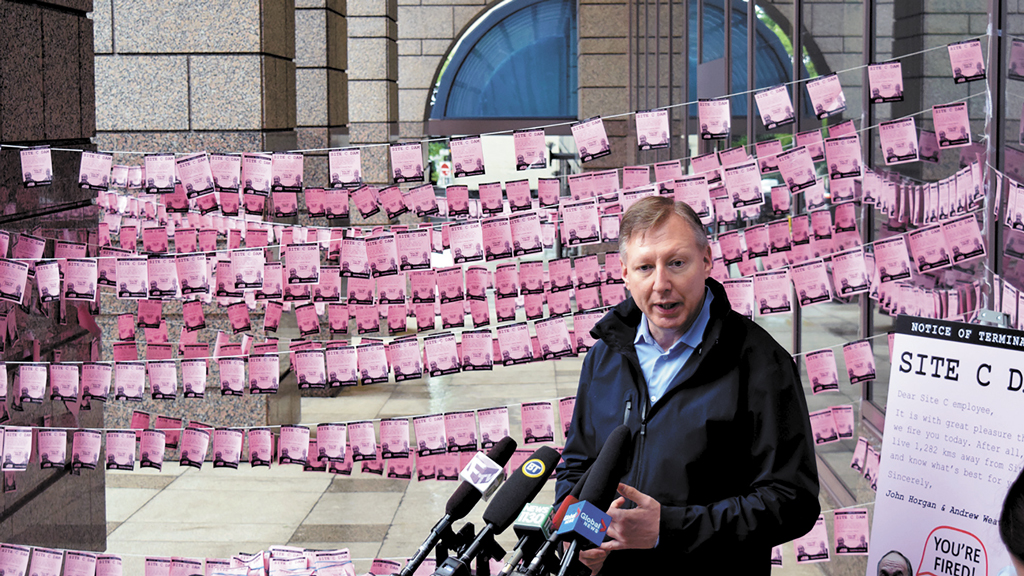
1/7
ICBA/ Approximately 2,252 “pink slips” were hung outside BC Hydro’s headquarters in 2017 to represent the amount of people who went to work that day on the Site C project. The event launched a campaign to push B.C’s NDP-Green alliance to move forward on the project.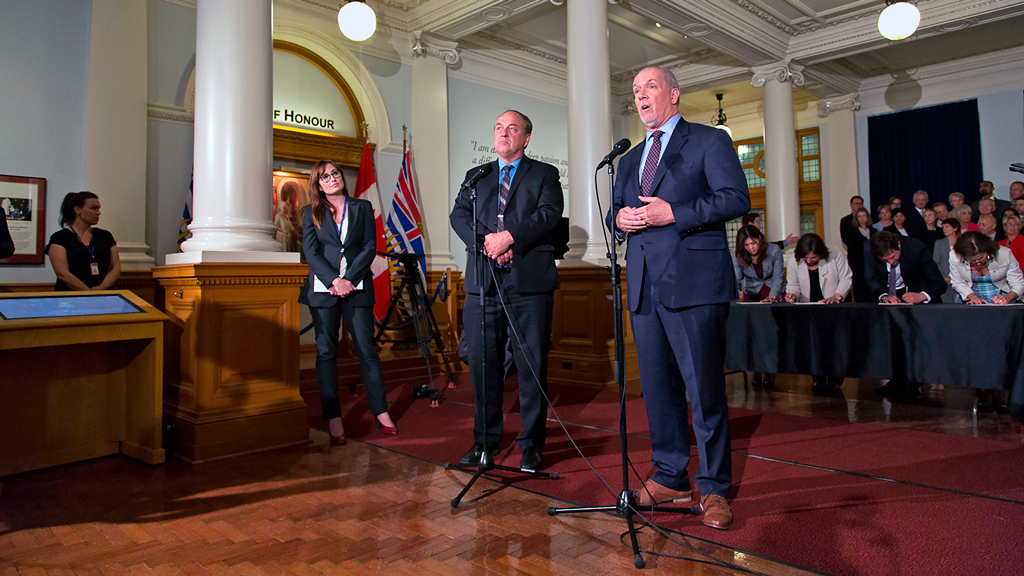
2/7
BC NDP Flickr/NDP Leader John Horgan and Green Party Leader Andrew Weaver faced the press after signing their partnership agreement while, in the background, their respective MLAs signed the agreement in Victoria. The agreement ultimately formed the next B.C. government.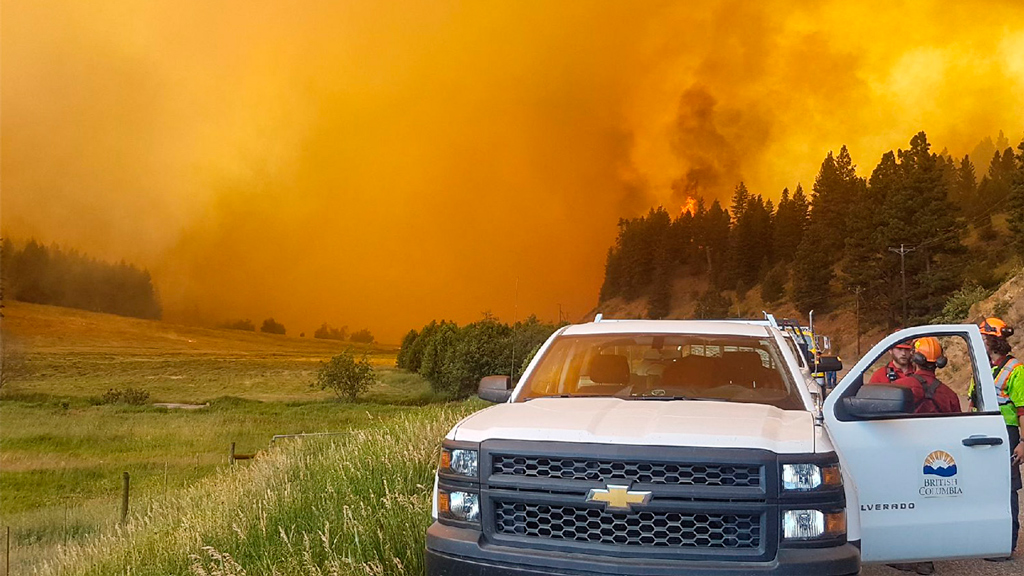
3/7
Province of B.C./ General contractors, subcontractors and manufacturers were hit hard as a result of the wildfires that burned across the province this summer.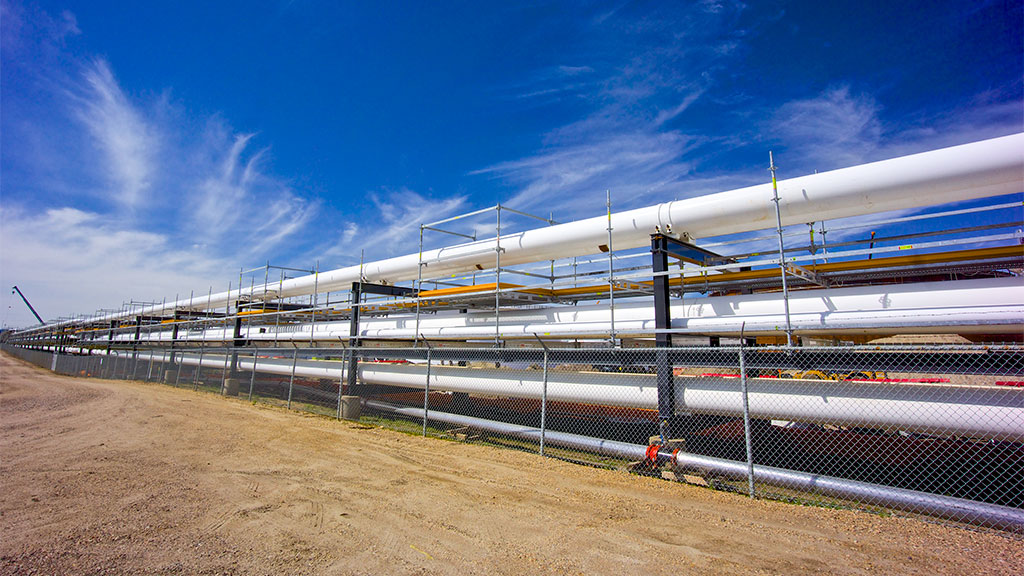
4/7
Trans Mountain/ Pipeline Alley, located in Sherwood Park, Alta., is a place where various company pipelines, including the Trans Mountain pipeline, converge. Work on expanding the Trans Mountain pipeline in Burnaby, B.C. can now proceed due to a ruling from the National Energy Board. The pipeline project generated a lot of news in 2017, with those speaking out both in favour and against the project.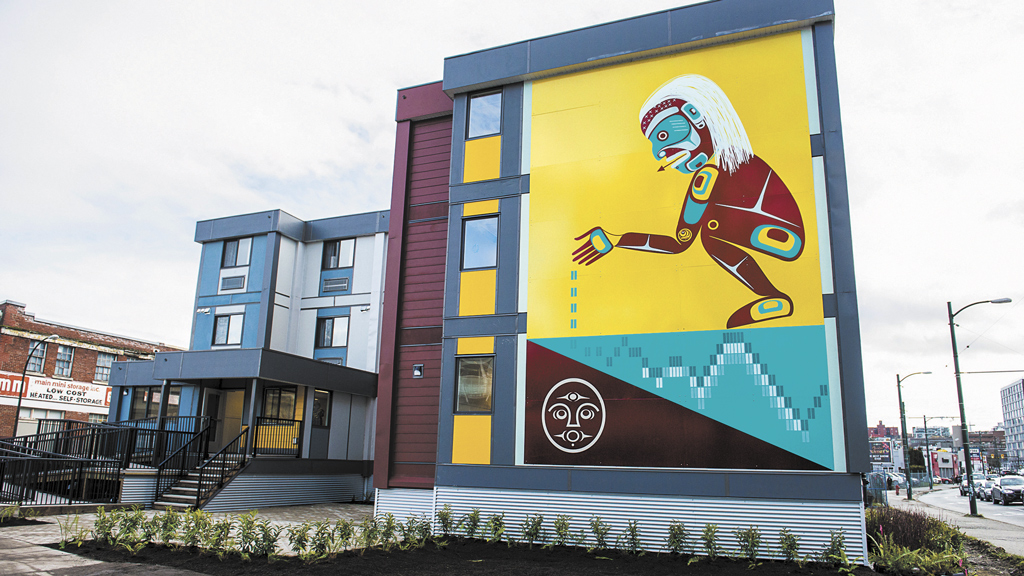
5/7
Vancouver Affordable Housing Agency/ 220 Terminal is a modular housing facility for low income residents in Vancouver. The pilot project is unique to the city and takes advantage of unused land in the heart of the city. The project can be taken apart and reassembled elsewhere once its current site is permanently developed.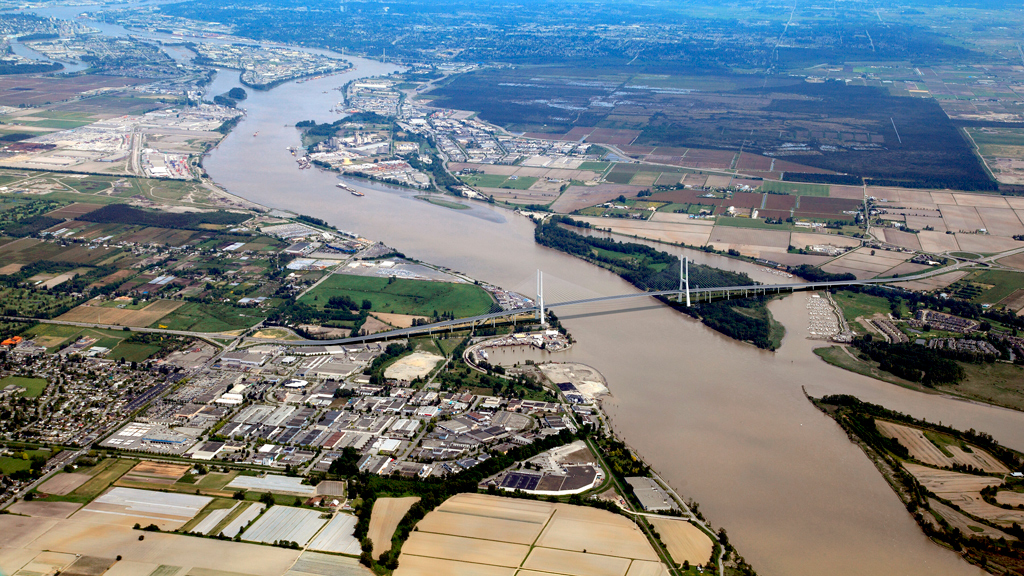
6/7
Province of B.C./ A model of the concept for the Massey Tunnel Replacement Project showed what the bridge would look like facing south towards Deas Island. The project would have spanned from Richmond to Delta, B.C. Procurement for the bridge was halted in September.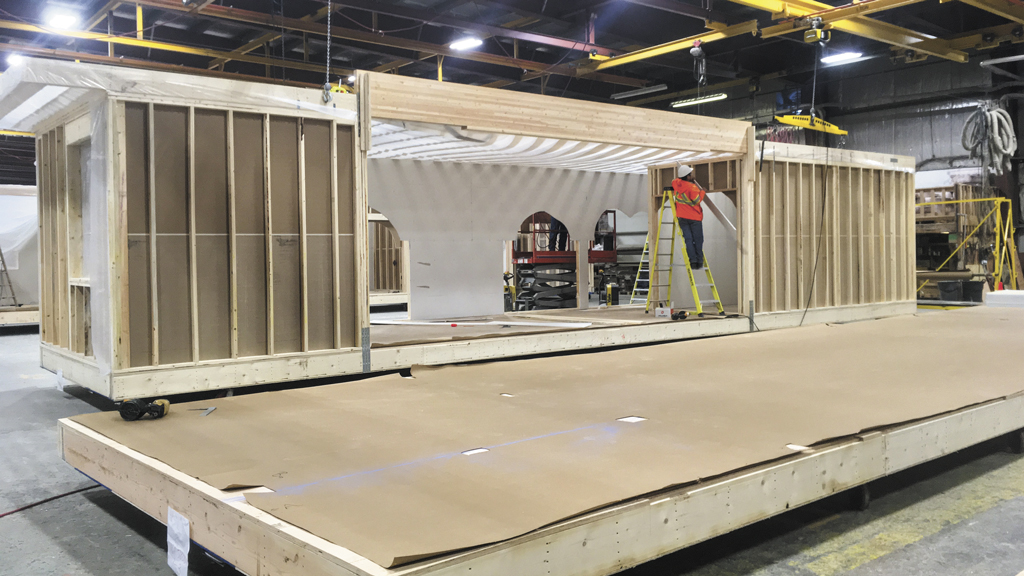


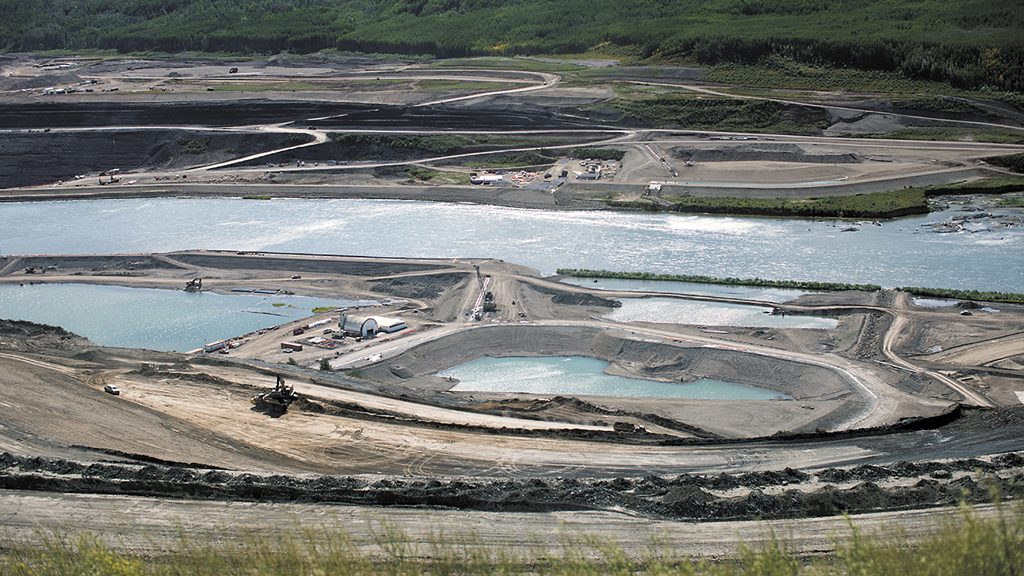








Recent Comments
comments for this post are closed